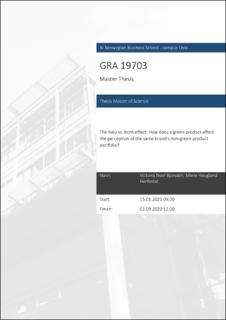| dc.description.abstract | With the increasing consumer demands of eco-friendly alternatives in the
marketplace, companies have started to think green. Many well-established nongreen
companies are now contemplating the launch of a green product to
complement their existing product portfolio. This paper attempts to expand the
existing and limited research on green horn effects, and how this effect is
particularly liable within the strong product category. In our main study, 124
participants rated the attributes of several sunscreens. Half of the group was
exposed to a brand, including both a green and a non-green sunscreen, while the
other group only evaluated the non-green sunscreen. To manipulate the research
purpose, the participants had to rate several other sunscreens. In addition to this,
we assessed the participants' pro-environmental orientation to analyze a potential
interaction with the effect of the certified green label. The results showed that the
participants were more negative towards the non-green product attributes when the
brand's product portfolio included a green sunscreen; as well as a decrease in
preference and purchase intention. This negative effect also extended to the brand
image. However, the hypothesized interaction effects with pro-environmentalism
were not supported empirically. These findings confirm the existence of green
horn effects on strength-related products and how it can affect the perception of
existing product attributes. This result adds to Yenipazarli & Vakharia (2015)
research on the risks of green line extensions, as well as Luchs et al., (2010)
research on strong product's negative trade-offs.
Keywords: horn effect, green horn, certified labeling, green strategies, green line
extension. | en_US |
